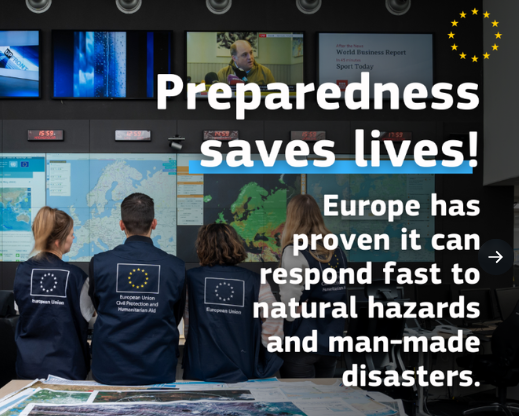Today, the Commission and the High Representative launch the Union's preparedness strategy to support Member States and strengthen Europe's ability to prevent and respond to emerging threats.
It comes at a time when the European Union is facing increasingly complex crises and challenges that cannot be ignored. From rising geopolitical tensions and conflicts, hybrid and cyber security threats, information manipulation and interference by foreign actors, to climate change and a growing number of natural disasters, the EU must be ready to protect its citizens and key societal functions that are essential to democracy and everyday life.
Specifically, the strategy includes 30 key actions and a detailed action plan to support the objectives of the Preparedness Union, as well as the development of a "culture of preparedness from the ground up" across all EU policies.
Chairwoman Ursula von der Leyen she said: "New realities require a new level of preparedness in Europe. Our citizens, Member States and businesses need the right tools to act both to prevent crises and to react quickly when disasters strike. Families living in flood-prone areas should know what to do when the water rises. Early warning systems can prevent regions affected by forest fires from losing valuable time. Europe stands ready to support Member States and trusted partners in the neighbourhood to save lives and livelihoods."
The main objectives and actions of the strategy include:
Protecting Europe's essential social functions:
- Develop minimum readiness criteria for essential services such as hospitals, schools, transport and telecommunications.
- Strengthen the stockpile of critical equipment and supplies.
- Improve climate adaptation and the availability of critical natural resources such as water.
Supporting population preparedness:
- Encourage the public to take practical measures, such as maintaining basic supplies for minimum 72 hours in case of emergency.
- Integrate preparedness education into the school curriculum and introduce an EU Preparedness Day.
Improving coordination of crisis response:
- Establish an EU crisis centre to improve integration between existing EU crisis structures.
Strengthening civil-military cooperation:
- Conduct regular EU-wide preparedness exercises, bringing together the armed forces, civil protection, police, security forces, medics and firefighters.
- Facilitate dual-use investments.
Strengthening foresight and the ability to anticipate:
- Develop a comprehensive EU-level risk and threat assessment to help prevent crises such as natural disasters or hybrid threats.
Strengthening public-private cooperation:
- Create a public-private preparedness task force.
- Formulate emergency protocols with businesses to ensure rapid availability of essential materials, goods and services and secure critical production lines.
Strengthening cooperation with external partners:
Work with strategic partners such as NATO on military mobility, climate and security, new technologies, cyber, space and defence industry.
Overall, by taking a proactive approach to preparedness, the EU aims to build a more resilient and secure continent, better prepared to meet the challenges of the 21st century.
Background
The Niinistö report on EU preparedness and readiness concludes that strengthening Europe's civilian and military preparedness and readiness to meet today's growing security challenges - in the areas of health, migration, technological security, climate, defence or the economy - is a matter of urgency. The report called for a profound change of mindset and a change in the way we understand and prioritise preparedness across the European Union. The report also recognised that preparedness is not just a national responsibility, but a shared European effort that requires a stronger role for the Union in coordinating and supporting Member States in this area.
The strategy therefore focuses on an integrated, whole-of-government approach to all risksbringing together all relevant actors at all levels of government (local, regional, national and EU), and company-wide approachbringing together citizens, local communities and civil society, businesses and social partners, as well as the scientific and academic community.
In addition, by working closely with Member States, the Union is able to face future crises - and can bring substantial and effective solutions to citizens and societies. The events and risks the European Union has experienced in recent years - and the strong and effective response to the COVID-19 pandemic - have shown how close cooperation between the European Union and Member States can deliver better outcomes for people and societies.
ec.europa.eu/ gnews.cz - RoZ



